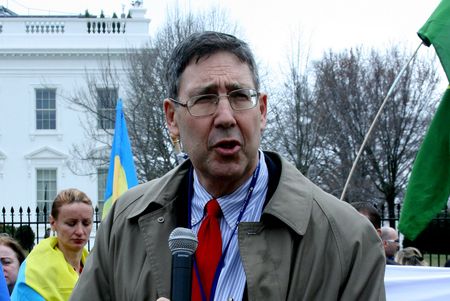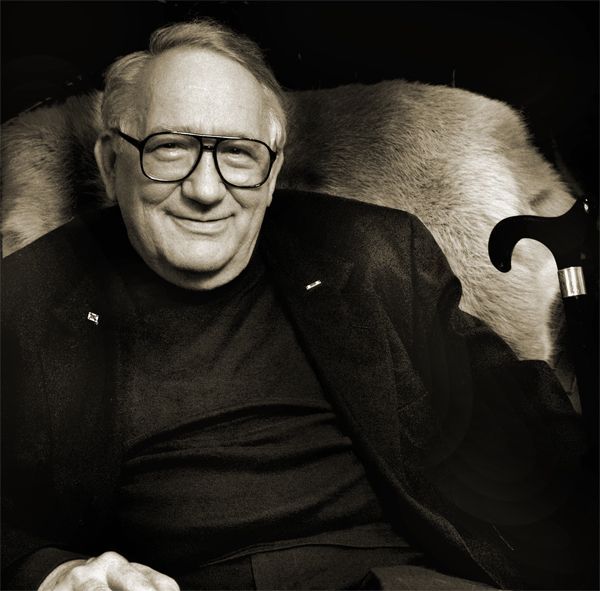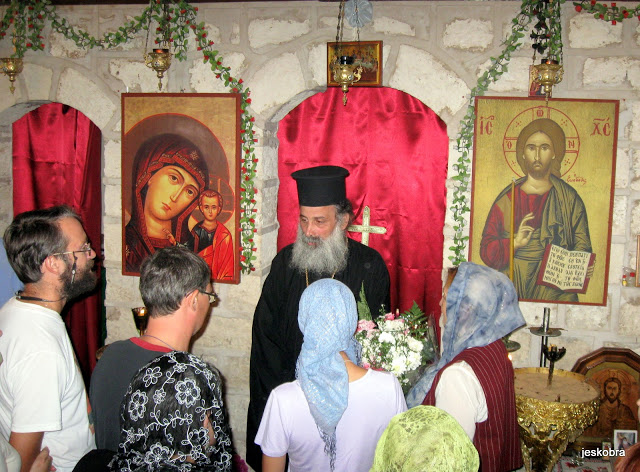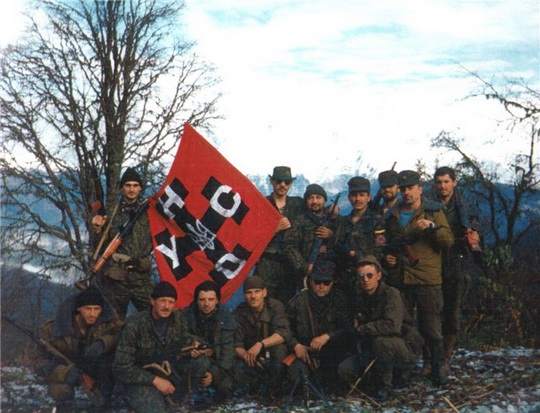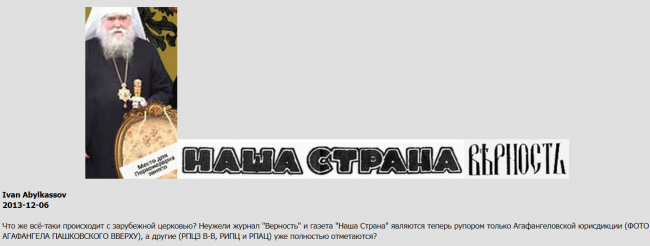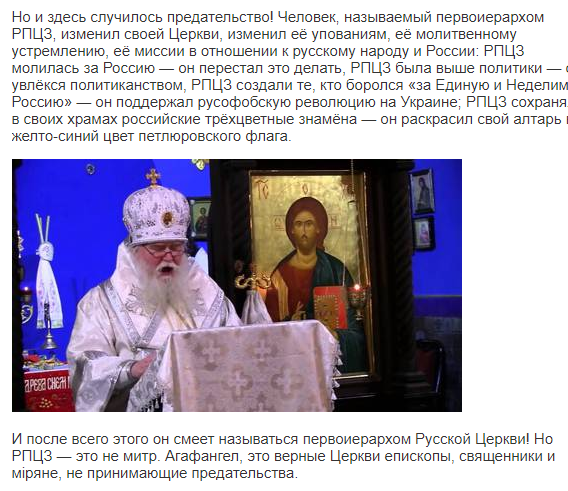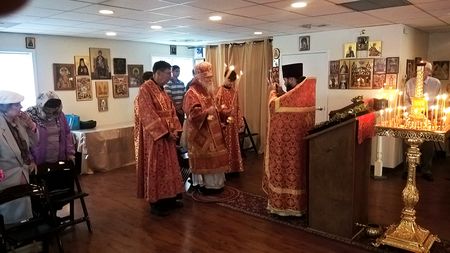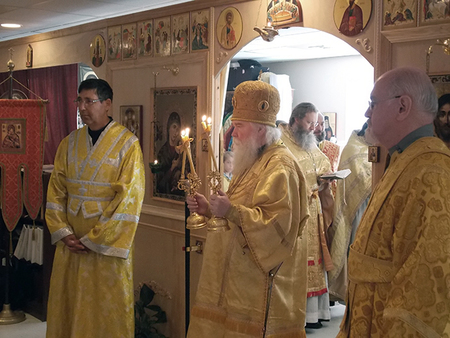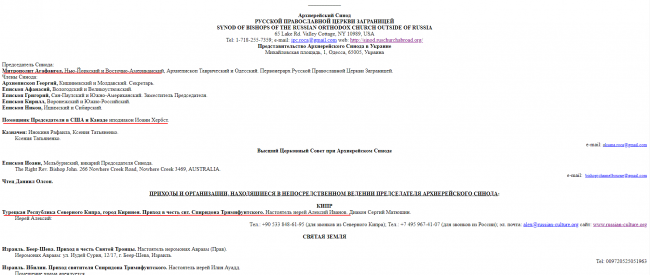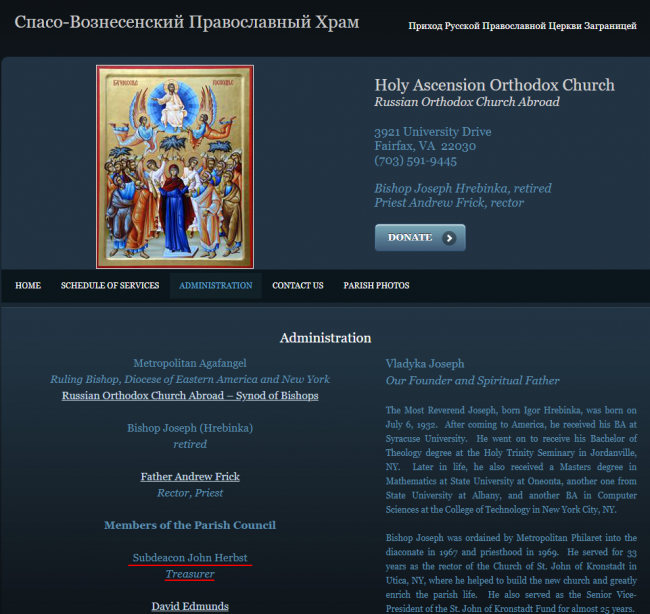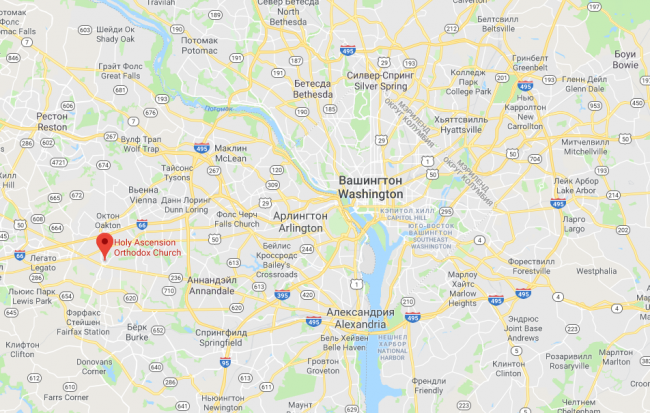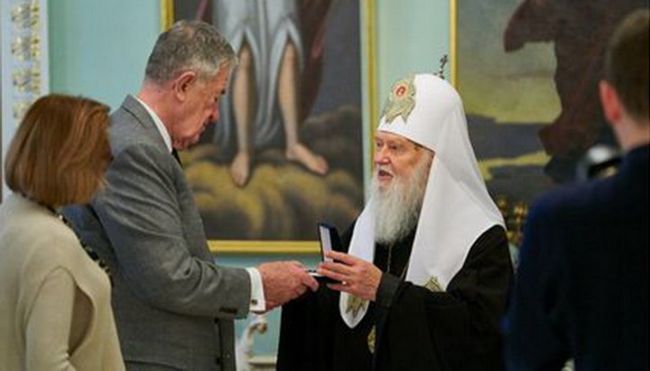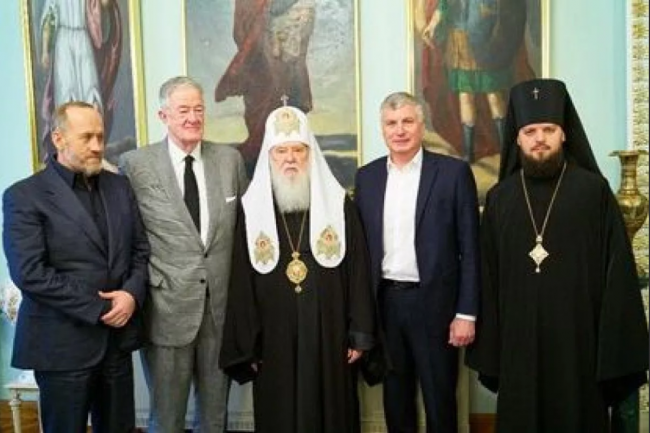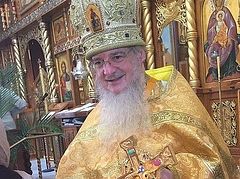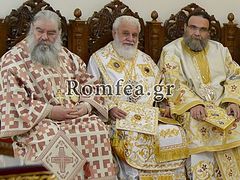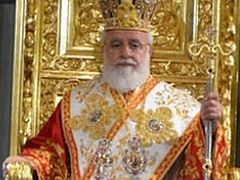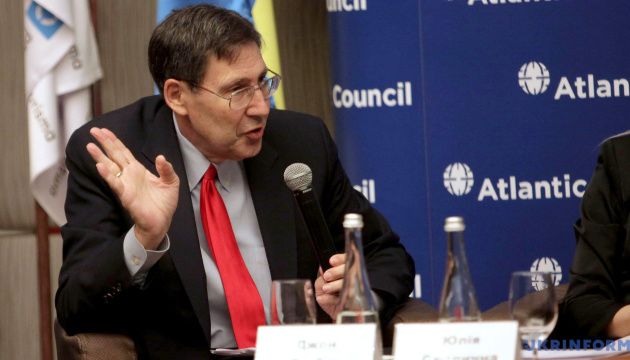 John Herbst. Photo: ukrinform.com
John Herbst. Photo: ukrinform.com
As schismatic groups seem to be popping up on the territory of canonical Churches like mushrooms, we have to ask: Is it all happening by itself, or is someone carefully cultivating it? The following investigation of a strange situation in Northern Cyprus can only leave us wondering…
* * *
“A large number of religious and secular media in a series of countries are stormily discussing the situation in the religious sphere in Cyprus, while for the Cypriots themselves this has practically become subject No. 1. Front and center is the schismatic clergyman Alexei Ivanov, who opened a parish in Northern Cyprus and at the moment is trying to secure the right to serve in churches belonging to the Church of Cyprus. The subject is being discussed in the highest circles, and even the head of the Church of Cyprus Archbishop Chysostomos II announced a few days ago that he intends to address the authorities with a request for information on this schismatic parish. Because the Cypriots in general know very little about the Russian-speaking schismatics, a number of media outlets have reacted to group’s name, ROCOR (Russian Orthodox Church Abroad), jumping to the conclusion that this is the same structure that signed the act of recognition with the Russian Orthodox Church, and therefore accused the ROC and Russians of being somehow connected with the schismatics in Northern Cyprus.”
These were the words addressed to me as an expert in religious matters by a representative of the Cypriot EOP/Εγώ ο Πολίτης party, Alexei Voloboev. He wanted me to give him some information on just what this structure is, what it is doing, and what in general is going on. I agreed to take up this work since it has to do directly with the crisis in the Church; I agreed to do it gratis, because I never take money for research in Church matters. What was my surprise when I learned that this problem in fact reach far beyond the borders of Cyprus.
I came to the conclusion that American diplomats and members of the military intelligence service are working through the schismatics on the territory of a number of Churches in that region, putting pressure in this way on the canonical Churches.
In order to understand who these schismatics are and what they are doing, we have to understand how they came about, under what conditions, and who is influencing them.
As we know, on May 17, 2006, in the Christ the Savior Cathedral, Patriarch Alexei II of Moscow and All Russia and the First Hierarch of ROCOR Metropolitan Laurus signed an act of canonical unity, which essentially legalized ROCOR, and announced the reunification of these two structures.
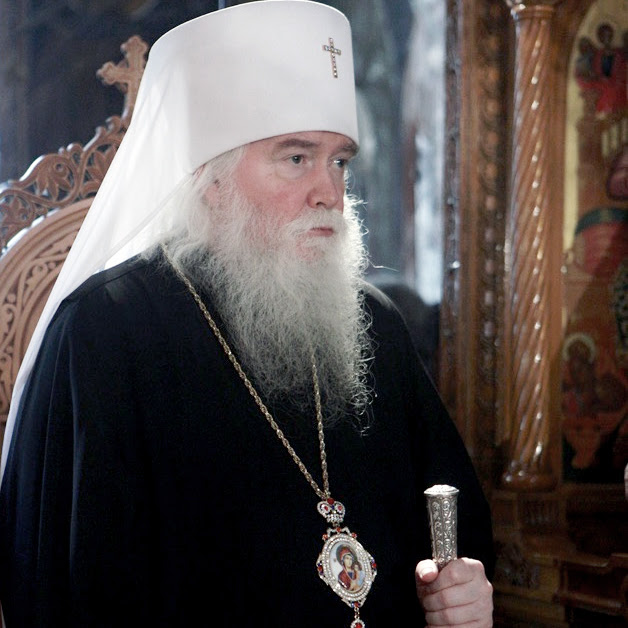 Metropolitan Agafangel (Paschkovsky)
Metropolitan Agafangel (Paschkovsky)
However, even as that document was being prepared there were a number of people in ROCOR who related extremely negatively to ROCOR’s rapprochement with the ROC. The leader of this opposition was considered to be Metropolitan Agafangel (Pashkovsky), who is located in Odessa. In the open source, Wikipedia [Russian language], we read about him:
“On March 27, 1994, in the St. Constantine Cathedral in Suzdal, without an agreement from the Synod of Bishops of ROCOR, he was consecrated bishop of Simferopol by two bishops of ROCOR who had been retired for going into schism: Archbishop Lazar (Zhurbenko) and Valentin (Rusantsov), and Feodor (Gineyevsky) whom the fist two had consecrated. ROCOR did not recognize Agafangel’s consecration from the outset. By decision of the ROCOR Synod on February 11/24, 1995, Hieromonk Agafangel, along with other creators of the schism, was suspended from serving. In order to test the reliability of Agafangel and the others who were consecrated without the approval of the ROCOR Synod, it was proposed to recognize the decision against Lazar (Zhurbenko) and Valentine (Rusantsov) as just, and for them to live for a trial period in the U.S. under the control of the ROCOR bishops. Agafangel (Pashkovsky) was the only one to agree to these conditions, and lived for nine months in the U.S. On December 9, 1995, he took an oath in the Synodal Cathedral of the Sign in New York and received a gramota titling him ‘Bishop of Simferopol and Crimea’.”
Thus did Pashkovsky end up in the ranks of the ROCOR episcopate. Nevertheless, even a year before the signing of the Act of Canonical Unity, strange things began to happen around the person of Pashkovsky. He came out in opposition against the unified structure, and in 2006 a letter appeared from a clergyman who had formerly been in submission to him, accusing Pashkovsky of collaboration with the U.S. secret services. In the letter, it was said:
“No normal people, and especially clerics of the ROC, are able to endure your antagonistic hatred for Russia, for its authorities and people, and your systematic slander of hierarchs and clergy of the Moscow Patriarchate.”
Later this letter appeared on a number of websites and even on the website of the ROC. The following words draw particular attention:
“How many times have you said that the CIA is the most humane organization in the world, because it “cares for the good of the people”, as opposed to the KGB-FSB… Almost all the clergy, including active parishioners, have guessed who is your protector. All have unequivocally commented on your connections with the U.S. special services. And in fact you yourself have not hidden it… Finally, you have stated that there are people who could help me and arrange a meeting for me with a certain Mr. John, who introduced himself as working for the American Embassy in Ukraine and offered me none other than collaboration with the special services of the United States. He advised me to think well about it, and after making a positive decision to contact him through you.”
Of course, one could suppose that this clergyman did not get along with this bishop and decided to slander him, and the ROC supported this criticism knowing that Pashkovsky preached enmity against the ROC. Nevertheless, the facts point to the contrary. And here we must mention two American officials who had a specific influence on Pashkovsky—one of them an American diplomat and ambassador, and the other a colonel of U.S. military intelligence. We are talking about John Herbst and Evgeny Magerovsky.
[Because the Pashkovsky schism confusingly took the name ROCOR, the Church that reunited with the Moscow Patriarchate is referred to as ROCOR (L), for Metropolitan Laurus, while the schismatic “ROCOR’ group is referred to a ROCOR (A), for Agafangel (Pashkovsky).—Trans.]
John Edward Herbst (born 1952) has a rich resume as a diplomat. In 1974 he received a Bachelor’s degree in the School of Foreign Service of Georgetown University, and five years later began working in diplomatic service. We are informed that from 1997 to 2000 he worked as the United States Consulate General in Jerusalem. It was there, in the words of representatives of a schism from ROCOR, that he was baptized and became a parishioner of that Church. This was reported in part on the website, Vertograd, in the article, “U.S. ambassador to Ukraine John Herbst tries to help ROCOR (L) parish” [in Russian], citing a certain note on the official site of that structure in Odessa, which was ruled by Pashkovsky:
“According to the website of the Odessa diocese, John Herbst received Orthodoxy while serving as U.S. ambassador to Israel during the forced transferal of the Jericho monastery from ROCOR to the ROC MP. He was baptized by a priest of ROCOR in the Jordan.”
After Israel, Herbst was sent to Uzbekistan, where he acted as ambassador from 2000 to 2003. We found the following commentary on this:
“This period is signified by the American operation in Afganistan and the beginning of the occupation in Iraq. Uzbekistan is becoming the first of the Central Asian republics that has offered its military bases to the Pentagon. It is no secret that this was preceded by delicate diplomatic work with President Karimov, which is being conducted by Herbst.”
From July 1, 2003 to May 26, 2006, Herbst was serving as the U.S. Ambassador to Ukraine. During this period in 2004, the Orange Revolution took place in Ukraine, and many pointed to Herbst as the “conductor” of this process. But from the Church’s point of view, what is interesting is something else. During this period, Herbst and Pashkovsky were very close. It is known that as U.S. Ambassador, Herbst conducted negotiations with the Prosecutor General of Ukraine, in which among other things Prosecutor General Sviatoslav Piskun promised to withdraw an accusation against one clergyman. It is shown that from these negotiations, which have come into open access, “The conclusion can be drawn that the Ukrainian prosecution acted in a number of instances under Washington’s dictates.”
But there was yet another man who had influence over Agafangel and the formation of the ROCOR (A) schism.
“It’s acceptable to say of the Americans that they have never warred on their own territory. Two World Wars in Europe and the Pacific Ocean, then Korea, Vietnam, and now Iraq and Afganistan support this opinion. But one gets the impression that Evgeny Magarovsky had his own war, and his participation in it was warmed by the understanding that this war is being conducted on his territory; that is, in the U.S. The Moscow Patriarch, loyal to the Kremlin, has invaded the West, including America, through ROCOR. Magerovsky’s life was uninterruptedly bound up with ROCOR—it was his Russia. He met his future wife Katya at the Long Island summer camp of the St. Seraphim of Sarov Foundation, led by one of the Russian Church Abroad’s more colorful representatives, Fr. Alexander Kiselev—the very man who was with General Vlasov’s Russian Liberation Army[1] throughout its tragic path. Having moved to Quincy, the young Magerovsky family attended the ROCOR parish there. Their daughter went to the Saturday church school.”
Here is an interesting story from one website after Magerovsky’s death. Of course, someone immediately noted a passage about a priest who served in the Russian Liberation Army during World War II, but in this case what is interesting is something else. Here is a description of Magerovsky’s participation in the creation of the ROCOR (A) schism, when Pashkovsky’s supporters refused to reunite with the ROC:
“After the signing in Moscow of the Act of Reunification of the ROC MP and ROCOR (L), Magerovsky became a member of the Temporary Church Council of the North American region of ROCOR,[2] participated actively in its work, as well as in the work of the following Fifth All-Diaspora Council. The meetings were heated, opinions freely expressed, and Magerovsky stepped a number of times up to the tribunal, leaning heavily on his cane, in order to have his say. He was always heard attentively as he was respected not only as a well-known author in church circles, but also as one who expressed the opinion of the laity that refused to throw themselves into Moscow’s arms after the lead of the now reposed Metropolitan Laurus. Although the Council’s results did not satisfy everyone, and in the lobby could be heard criticism against the new Metropolitian of “ROCOR” Agafangel (Pashkovksy), Magerovsky very laconically and confidently noted in our discussion, ‘Let them say what they want; Agafangel saved the Church.’ And I also heard again from him after the Council, ‘That’s all, now our Church is saved!’ In this phrase could be heard the fatigue of a man who had worked hard and well, and was pleased with the fruits of his labors.”
So, who is this Evgeny Magarovsky, who was so influential in the creation of ROCOR (A), and opposed the reunification with the ROC? It so happens that he is a colonel in U.S. intelligence. We read in open sources:
“Evgeny Lvovich Magarovsky (Dec. 11, 1934–January 18, 2009)—an American Russian Studies specialist; a state, public, and religious figure of Russian origin. A Doctor of Political Science, professor of the cathedra of Russian studies at Georgetown University in Washington, colonel of the general staff of U.S. military intelligence, vice president of the Russian Academic Group in the U.S.”
That is, the Pashkovsky schism was formed under the influence of two American officials at the same time, both of whom were closely tied with the U.S. armed forces—diplomat John Herbst and intelligence colonel Evgeny Magerovsky. Moreover, as certain notes recall, Magerovsky was even at one time Agafangel’s representative in the U.S.; however he said of himself that he is an entirely unreligious man. That is, for him as a professional intelligence agent, the church scene was only an instrument for achieving his aims:
“At his own admission, he was a completely unreligious man. And he possessed no canonical knowledge, or even the most elementary knowledge in the realm of Church life” (F. Sergeyev [U.S.A] Nasha Strana, No. 2859, January 17, 2009, p. 8).
Here we should also recall how closely Pashkovsky was connected with these American officials. Two episodes quite clearly illustrate this: the sending of delegates to the council in 2006, and a letter of the hierarchs of ROCOR to the head of the Old Calendarists in Bulgaria.
1) 02.27.2006, representatives of the Council protested the participation of Herbst, pointing out that he has long worked and supported contacts with the CIA.
3) 04.2006: “As a result of a telephone call amongst hierarchs of ROCOR, John Herbst was recognized as chosen by the Odessa diocese as delegate at the Fourth All-Diaspora Council.”
That is, Pashkovsky tried to push through to the Council an obvious enemy of the reunification with the aim of wrecking the negotiations. This idea was met with the reasonable objection to a person holding the post of U.S. Ambassador overseeing all matters—from the most elementary to collaboration with the Central Intelligence Agency, and that the presence of such a person at the Council is unacceptable. But finally Agafangel, notwithstanding all arguments to the contrary, upheld the right for Herbst to go to the Council as a delegate from the Odessa diocese. This shows how close Herbst was to Agafangel. And here of interest are Magerovsky’s notes on this. In March 2006 he writes that the bishops of ROCOR are not sufficiently patriotic with regards to the U.S.A., expresses his perplexity as to why they dislike the CIA, and as if in disgust flings in their face that earlier the Synod received money from the CIA through Bishop Gregory Grabbe.
“Yes, an ambassador should oversee all aspects of foreign state relations and represent all the agencies of his country, from the Department of Fishing and Hunting to the CIA. What is so shameful about that? After all, the CIA is an official agency of the American government. And the Synod has been in a close relationship with this agency, at least during the first thirty years of its presence in America. The late Vladyka Gregory (George Grabbe) had excellent relations with them. He even managed to receive quite a good sum of money for the Synod in its war with Bolshevism. Obviously, under the influence of their newly acquired ‘friends’ they have forgotten old times and for some reason have begun to alienate themselves from the organization that they once considered salvific. Moreover, only in Moscow apparently does the CIA earn reprobation, while for us it is an ordinary thing. In general, Moscow has a very interesting relationship with such organizations. For example, the FSB is in great favor with them, the Patriarch himself grants all sorts of awards to its bosses, but for some reason it holds our CIA in contempt.”
No comment is needed here—it was all stated very clearly. Magerovsky considers that every upstanding American clergyman should collaborate with the CIA and should not be ashamed of receiving money for that. This is the man who would later become Agafangel’s representative in the U.S.
Now let’s turn our attention to the letter of the ROCOR episcopate signed by Metropolitan Laurus and a number of other hierarches. In this letter addressed to the head of the Bulgarian Old Calendarists, the hierarchy of ROCOR recalls that there is a certain opposition to the process of reunification of the ROC and ROCOR. In the text are named three leaders of the movement that is opposing the unification with the ROC. And two of the three are the figures now known to the reader: Bishop Agafangel Pashkovsky is in first place, and in third place is the U.S. intelligence colonel Evgeny Magerovsky, who was his trusted helper.
Thus it can be seen that at the time of the creation of the schism of ROCOR (A), both russophobic American officials Herbst and Magerovsky had enormous influence over this process, and both were part of Agafangel’s inner circle. These men were so close to Agafangel that at one moment the U.S. Intelligence colonel was even his official representative in the U.S.
Not recognizing the unification of the ROC and ROCOR, Agafangel Pashkovsky created the “Temporary Supreme Church Government of the Russian Orthodox Church Abroad”, and in 2008 he stated that all those who did not join with the ROC are the true faithful, and therefore took the name of ROCOR for his structure. By force of this, the schism received the name, ROCOR (A).
In response to this, the ROCOR Synod defrocked Pashkovsky.
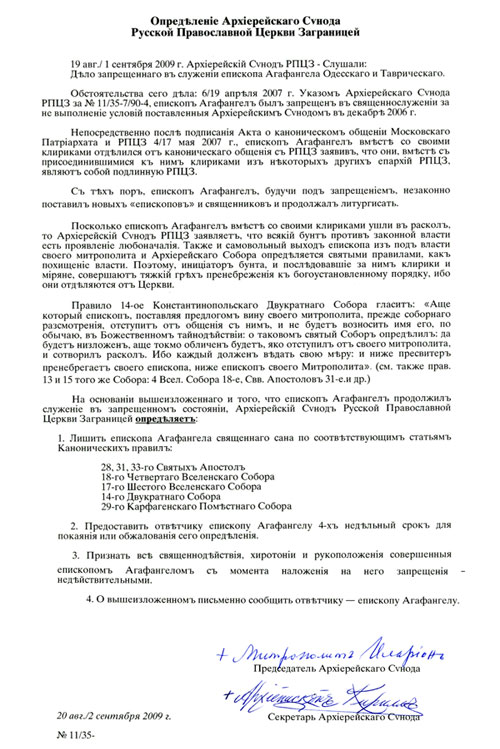 ROCOR Synod decree, defrocking Pashkovsky
ROCOR Synod decree, defrocking Pashkovsky
And some time later the Synod suspended those who refused to accept the unification of the ROC and ROCOR.
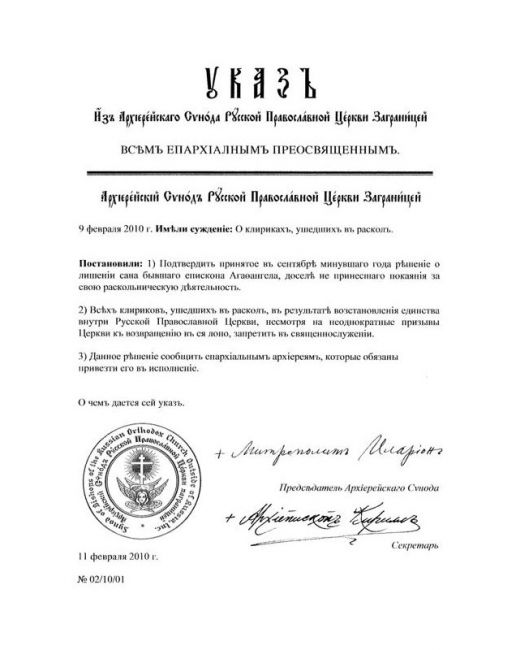 ROCOR Synod decree suspending those who refused to accept the unification
ROCOR Synod decree suspending those who refused to accept the unification
It is to this very structure of ROCOR (A) that the cleric Alexei Ivanov, who is active on the territory of Northern Cyprus, belongs.
It is also worth noting that ROCOR (A) is active not only on the territory of Cyprus, but also on the territory of neighboring Israel. There Roman Radaun, who received his theological education in the Holy Trinity Seminary in Jordanville, was made a bishop.
On the territory of Israel, besides Roman Radaun, five more priests of ROCOR (A) are active. In this light the situation that has developed on the territory of the Jerusalem Patriarchate draws our attention. ROCOR (A) bishop Roman Radaun is not only conducting services on the canonical territory of this Church, but has met with the former patriarch, Ireneus.
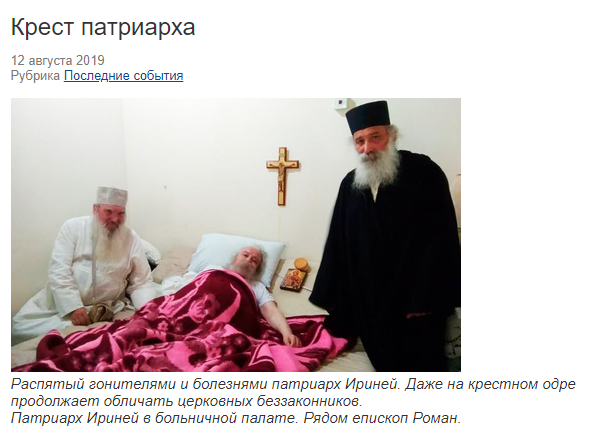 The Cross of the Patriarch. “Crucified by persecutors and illnesses, Patriarch Ireneus. Even on his sick bed he continues to rebuke the clerical lawless. Patriarch Ireneus in his hospital room. Next to him is Bishop Roman.”
The Cross of the Patriarch. “Crucified by persecutors and illnesses, Patriarch Ireneus. Even on his sick bed he continues to rebuke the clerical lawless. Patriarch Ireneus in his hospital room. Next to him is Bishop Roman.”
But other members of the ROCOR schisms also meet with him.
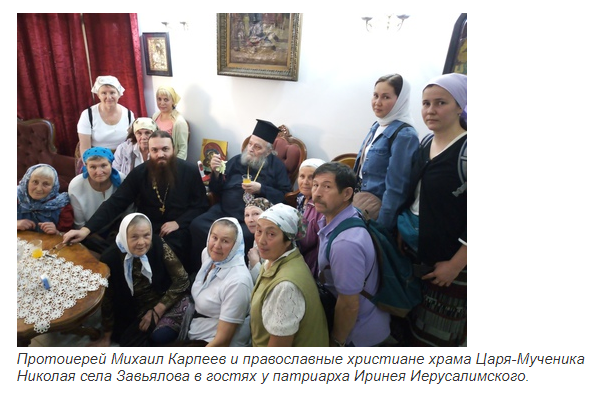 “Archpriest Mikhail Karpeyev and Orthodox Christians from the Church of the Tsar Martyr Nicholas, Zavyalov village, visiting Patriarch Ireneus of Jerusalem.”
“Archpriest Mikhail Karpeyev and Orthodox Christians from the Church of the Tsar Martyr Nicholas, Zavyalov village, visiting Patriarch Ireneus of Jerusalem.”
On the website of the Jerusalem Patriarchate Raduan is characterized as a “false bishop”, while the schismatics themselves write that Ireneus is the lawful patriarch. It follows that they consider Patriarch Theophilus to be unlawful.
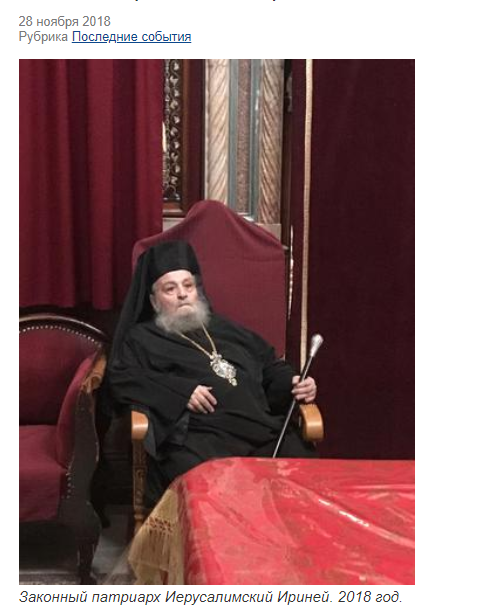 “The lawful Patriarch of Jerusalem, Irenaus. 2018.”
“The lawful Patriarch of Jerusalem, Irenaus. 2018.”
Notable in this regard is the commentary of a bishop who is also in schism:
“In October 2017, Archbishop Andronik (Kotlyarov), separated at the time from Agafangel (Pashkovsky), noted, ‘Several years ago, Met. Agafangel ordained bishop Roman for service in Israel, on the territory of the Jerusalem Patriarchate. This was done with the supposed agreement of the ‘imprisoned’ Patriarch Ireneus, who was not likely to be able to make sense of this business. Now Ireneus has submitted himself to the new Patriarch of Jerusalem, Theophilos. And what status does Bishop Roman have, who remains in the Synod of Met. Agafangel? Has he encroached upon the territory of another Local Church? I served twenty-five years in the Russian spiritual mission in Jerusalem and well know the accepted rules and customs there. There has never been a Russian bishop in the Holy Land, even during the time of the Russian Empire. We upheld the status quo and recognized the Jerusalem Patriarchate. That is why the leaders of our mission were in the rank of archimandrite, and not bishop.”
<…>
Even the famous blogger from Northern Cyprus Sergei Eletsky, who hates Putin with a passion and constantly writes in support of the politics of Ukraine, harshly criticized Alexei Ivanov when he learned that he was a cleric of a schismatic structure. And Eletsky emphasized that when Ivanov arrived on the territory of Northern Cyprus he had good financial support and invited the locals with lavish gestures:
“Every person has the right to believe or not believe in whatever he wants. People have free will. But to pretend and masquerade under some religion is another matter indeed. Have you ever seen the false clerics who walk through the commuter trains and stations, collecting money? Well now they’ve shown up in Northern Cyprus. About two years ago a certain Alexei Ivanov appeared in Northern Cyprus. Ostensibly the man came with good deeds and bright Christian intentions and ideas. Alexei spared no expense in portraying himself as a benefactor. On the Christmas holidays he rented one of the most expensive hotels in the city and invited the kiddies with their parents to celebrate the feast. The food was great; there were gifts and a multitude of performers… All well done. He organized several tours to other cities. He renovated a church not far from Cyrene. He tried to organize a Sunday school. He created an internet site on which he managed to get several people to write. But then came a thunderbolt across the clear blue sky when the Russian Orthodox Church announced that Alexei Ivanov has nothing to do with Orthodoxy.”
<…>
We can’t help but notice that after the schismatics in Northern Cyprus received a permit to conduct services, the activity of the ROCOR (A) hierarchy considerably increased.
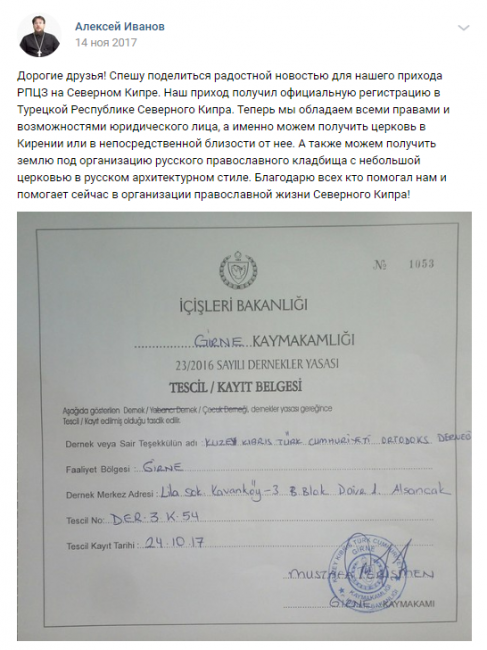 Ivanov’s social media post announcing the “good news” that their parish has been officially registered in the Turkish Republic of North Cyprus, and that now they have all the rights and opportunities of a legal entity
Ivanov’s social media post announcing the “good news” that their parish has been officially registered in the Turkish Republic of North Cyprus, and that now they have all the rights and opportunities of a legal entity
On May 24, 2017, the head of ROCOR (A) Agafangel Pashkovsky arrived on the territory of Northern Cyprus, where he conducted services.
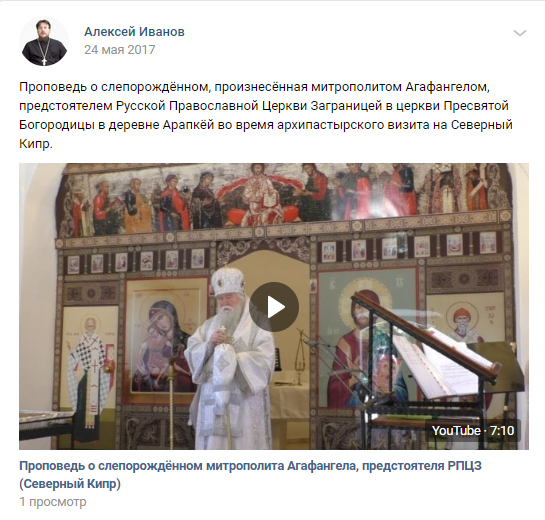 Ivanov’s social media post of Agafangel Pashkovsky’s sermon in North Cyprus
Ivanov’s social media post of Agafangel Pashkovsky’s sermon in North Cyprus
On May 9, 2018, representatives of ROCOR (A) concelebrated in Attica with Old Calendarists from Romania and the “True Orthodox Church” of Greece.[3]
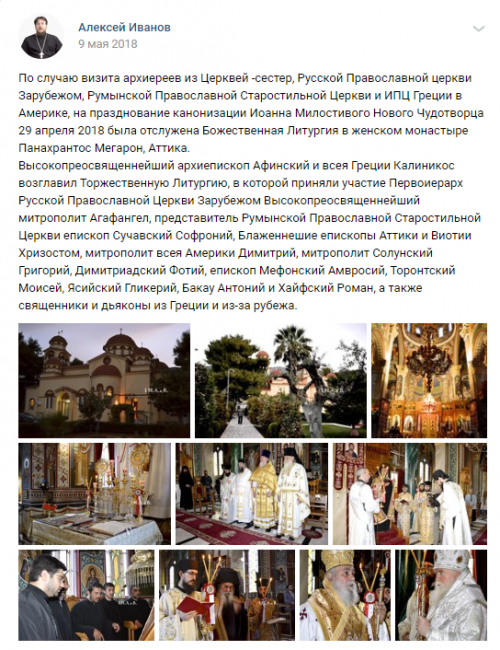 Ivanov’s social media post on the concelebration
Ivanov’s social media post on the concelebration
On July 7, 2019, Roman Radaun of ROCOR (A) arrived from Israel to Northern Cyprus and served there.
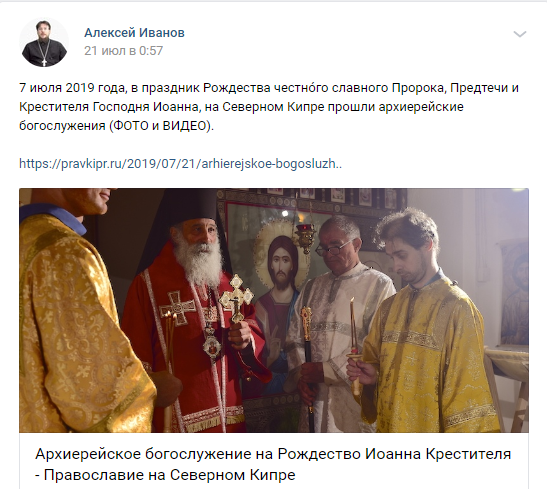 Ivanov’s post on the hierarchical service by Roman Radaun in North Cyprus
Ivanov’s post on the hierarchical service by Roman Radaun in North Cyprus
On August 22, 2019, in response to a series of publications in the media on the activities of the schismatics on the territory of Northern Cyprus, Alexei Ivanov published a recording on the parish’s website, saying:
“Did a parish of ROCOR in Northern Cyprus encroach upon the canonical territory of the Orthodox Church of Cyprus? If we look at this question formally and superficially, then we can say that it did.”
After which he goes on to say that no one else is conducting services on this territory, and they have received registration documents from the Turkish authorities, which according to him justifies his activities on the canonical territory of the Church of Cyprus.
On September 9, 2019 the cleric of ROCOR (A) Sergei Ivanov addressed Archbishop of Cyprus Chrysostomos with harsh criticism in response to his statement concerning the activities of the schismatics in Northern Cyprus. He portrayed himself as a part of the Russian population, and tried to present the situation as if some discord existed between the Church of Cyprus and the Russians.
Here it is appropriate to say that these schismatics are in fact leading astray both the Cypriot Church and the Russian speaking population of Cyprus. The fact of the matter is that essentially ROCOR (A), regardless of the name, has nothing in common with the whole concept of “Russian”. Even other representatives of the schism who did not recognize the reunification with the ROC have pointed to Agafangel Pashkovsky’s russophobia, but the clearest example of this is the fact that the famous Ukrainian radical Dimitry Korchinsky, many of whose followers from the “Brotherhood” organization are unabashed Nazis, wrote back in 2006 that he and his disciples are parishioners of the ROCOR (A) structure under the leadership of Agafangel Pashkovsky.
That very Korchinsky who made fun of World War II veterans, who even before the Maidan revolution of 2013 strove to support separatist movements in the Russian Federation, who went as a member of the UNSO[4] to kill Russian soldiers in Chechnya, reminds us of his connections with ROCOR under Agafangel’s leadership.
“Many of the ‘Brotherhood’ are members of this parish… I got tired of making peace between our brothers and I said: Over there are the ‘zarubezhniki’ [nickname for ROCOR.—Trans.]. There’s nothing more canonical. Everyone recognizes them… Our Moscow brothers sympathize with us because they want to unite with the zarubezhniki. Besides, the ‘zarubezhniki’ are traditionally non-conformists—just what we need… Our parish doesn’t have it’s own building yet. It’s easiest to find by going to Grushevsky 16 to the Brotherhood’s headquarters. Our spiritual advisor, just like before, is Fr. A. Slobodnyak. He is under Bishop Agafangel, who governs all the affairs of ROCOR (L) in Ukraine.”
In fact, many of those who schismed from ROCOR were Nazis. There was even an argument on this theme between two representatives of ROCOR schisms (notably, the periodical “Vernost” [“Faithfulness”], whose editor has been accused of plagiarism, was at one time under the strong influence of Pashkovsky, which evoked indignation from representatives of other ROCOR schisms), over precisely who made the speech in praise of Hitler during the period of WWII. But hatred for Russia is after all an anomaly in their ranks, and this factor repelled many representatives of ROCOR from Agafangel and his followers. This is what they say about it:
“But even here, betrayal has happened! A man who is called the First Hierarch of ROCOR has betrayed his Church, betrayed its hopes, its prayerful striving, its mission with regard to the Russian people and Russia: ROCOR prayed for Russia; he stopped doing that. ROCOR is above politics, and he has gotten into politics. ROCOR was created by those who struggled ‘for the One and Indivisible Russia’; he supported the russophobic revolution in Ukraine. ROCOR preserved the Russian tri-color flag in its churches; he has adorned his altar with the yellow and blue Petliura[5] flag.
“And after all this he has the audacity to call himself the first hierarch of the Russian Church! But ROCOR is not Met. Agafangel, it is the faithful bishops of the Church, priests and laity, who do not accept betrayal.”
It is notable that those clerics who left Agafangel in November 2014, among other things also stated that Pashkovsky collaborated with the Ukrainian extremists, amongst whom are also extremists of the Right Sector, famous for their hatred of Russia:
“And besides, there are his many years of, so to say, groundwork in support of the Ukrainian authorities, the Orange and pro-American forces, extremists (over ten years of association with Korchinsky), militants of the Right Sector, organization of the ‘Shield of the Fatherland’—after all these are very serious things. We have closed our eyes to this for too long. And he did this all surreptitiously. These matters have almost never been discussed. He has always dodged any specific, direct questions. And then it all continued on as before.”
And now let’s return again to Mr. John Herbst. His influence on the military-political situation in the Mediterranean region cannot but be noticed from precisely the point of view of russophobia and opposition to Russia. We know for example that not long ago, the U.S. proposed withdrawing the embargo against Cyprus for the sale of armaments, but under the condition that Cyprus refuse to serve Russian ships. Cyprus did not accept the proposal. But interestingly, Herbst already a year ago promoted the idea of closing European ports to Russian ships from the Sea of Azov. Before that, he proposed many times that the U.S. supply lethal weapons to Ukraine. He can easily push these agendas, being in his current position. The fact is that in July 2010 he was appointed director of the National Defense University Center for Complex Operations, and is also the director of the Eurasian Center of the Atlantic Council—an organization that forms Washington’s political course in many ways. On the website of the Atlantic Council we read about the spheres in which Herbst works: “International security, security in the Middle East, NATO and its partners, U.S. foreign policy, American-Afgani relations,” as well as the appointed territories over which Herbst’s activities spread within the framework of this organization’s activity: Central Asia, Eurasia, Israel, the Middle East, Palestine, Russia, and Ukraine. Among other things, on the website of the Atlantic Council we find text from March 31, 2019 about how work is on to bring Cyprus closer to NATO.
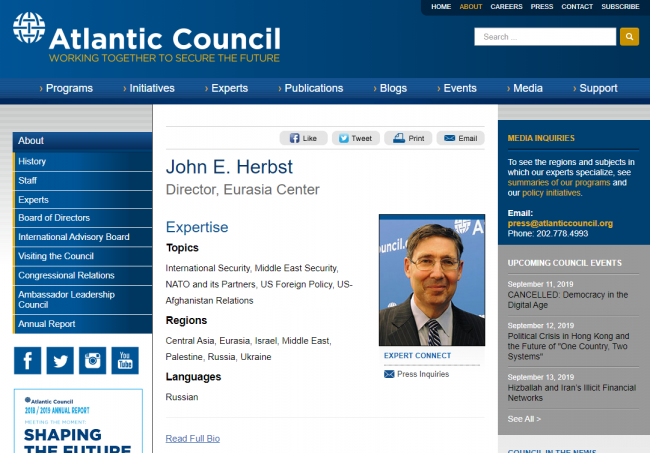 Screenshot, Atlantic Council website
Screenshot, Atlantic Council website
Due to its anti-Russian activities and collaboration with U.S. special services, in July 2019 the Atlantic Council was recognized by the Russian General Prosecutor as an undesirable organization. To put it simply, it was expelled from the territory of Russia. I remind you that Russia was one of the countries where Herbst’s underlings were active. And now it turns out that an active high American government official, who forms the policies in Washington and is tied with the activities of the CIA and NATO, has direct influence over the leadership of a schismatic structure that is active on the territory of a number of canonical Churches and conducts oppositional activities against those Churches. Moreover Herbst himself, beyond his military-political activities, periodically busies himself with matters of religion.
For example, not long ago he came out in support of the tomos of autocephaly in Ukraine, pointing out that in his view this is a means of opposition to Russia and the ROC.
“This is a huge blow against Moscow Patriarch Kirill and his close ally, President Vladimir Putin,” states Herbst on the Atlantic Council website.
That is, for him, religious activity is no more than another way to battle against Russia and carry out political aims. And his people on Cyprus are now busy with these very aims—cleric Alexei Ivanov from ROCOR (A) is trying with all his might to sow enmity between the Russians and the Cypriots, between the Cypriot Church and the ROC. In the global sense, the people of this schism, upon which Herbst has direct influence, are creating pressure upon a whole series of Churches in this region (after all, the activity of schismatics on the canonical territory of these Churches is in fact open aggression against the canonical Churches): It is enmity against the Cypriot Church, against the Greek Church, the Jerusalem Church, and the ROC.
Think that Agafangel Pashkovsky’s subdeacon could have such an influence on this structure? Eat your heart out—I’ve saved the best for last. In 2016, after a prolonged conflict and after several parishes and hierarchs of that structure left Pashkovsky, he had a meeting in Greece with his bishops in order to resolve the conflict. John Herbst was present at this meeting. As a result of negotiations, relations were normalized: Archbishop Andronik stated that he will recognized the decision of the Synod of ROCOR (A), and Metropolitan Agafangel withdrew his decision to retire Andronik.
But a month before this meeting, Metropolitan Agafangel appointed Herbst his personal assistant and made him a member of the ROCOR (A) synod!!!
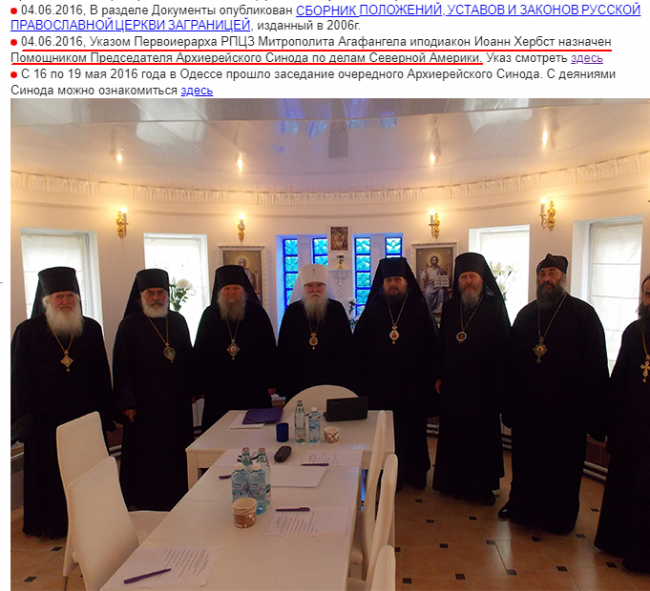 Post from the ROCOR (A) website showing the synodal resolution appointing subdeacon John Herbst as Assistant to the Chairman of the Synod of Bishops for affairs of North America
Post from the ROCOR (A) website showing the synodal resolution appointing subdeacon John Herbst as Assistant to the Chairman of the Synod of Bishops for affairs of North America
And here is a photograph of that very subdeacon John Herbst (photo from the schismatics’ resourses dated 2018):
And another photo of the Washington politician in the role of a hierarchical subdeacon:
On the official site of the schism Herbst is listed in the Synod as assistant to Metropolitan Agafangel. He is also listed in the Washington parish as Treasurer, which gives him the ability to influence the structure’s cash flow. Besides this, on the schismatics’ forum, text can be found of a letter by the former chairman of the Fund for Assistance of ROCOR Dimtry Goncharov, who recalls that John Herbst’s wife Nadezhda Herbst was the secretary of this fund (could that be where the money came from that Alexei Ivanov so generously spread around when he came to Northern Cyprus)?
In the list are shown all the clerics of this schism, and those who wish can find not only Alexei Ivanov, but also all the rest of the clergy of ROCOR (A) in various countries.
And here is the parish website in Washington, where Herbst is shown as treasurer:
As posts on various websites show, Herbst was the creator of various initiatives and informational projects by this structure.
And on the website of ROCOR (A) one can’t help but notice the synod’s address, where Pashkovsky moved it: “Synod of Bishops of the Russian Orthodox Church Abroad, 65 Lake Rd., Valley Cottage, NY 10989, USA. That is, despite the fact that Agafangel is located in Odessa, the center where decisions are made was moved to New York, while in Ukraine, in Odessa, there is only a representation of the synod. An interesting situation.
Of course, it’s much more complicated for Agafangel Pashkovsky to control the synod now that it’s in New York than when it was located in Odessa. It’s probably more complicated to go there for Agafangel, but for Herbst and the other officials it is obviously simpler (after all, they don’t have to appear in Ukraine and draw undue attention from the Ukrainian media with their visits). But the question arises: Is an insignificant schismatic really in control of a serious Washington official or is it the other way around? Herbst is the supervisor of this structure from the government and secret services angle, and has such strong influence that he was brought in as a member of the synod without even being a clergyman (he is the only member of the synod without clerical rank—all the rest, according to the list, are bishops).
It’s not difficult to guess that the activities of such an official, who is tied to the U.S.’s operations in Afganistan, the Ukrainian revolution of 2004, NATO operations, and U.S. military representatives, is not likely to bring peace to the Mediterranean region and smooth sailing to the Local Churches.
As for the situation in Cyprus and Israel, considering the fact that the ROCOR (A) schism was created with the active participation of U.S. diplomats and intelligence agents, who have even become Synod members; and considering that the structure itself is registered in the U.S., I think that the only way out for the Local Churches in this situation would be to directly address the puppet masters who have essentially created and continue to support this schism with the intent to use it as a factor for applying political pressure on various countries and Churches. To put it simply, without the decision of John Herbst I doubt that any important resolutions will be enacted within this structure. Therefore, the simplest and most effective method would be for the heads of the Churches to directly address the American official or his superiors and request that they cease their activities directed at the suppression and destruction of the canonical Churches.
In summary, this is by far not the first case in which the U.S. special services have used schismatics to put pressure on and oppose the canonical Churches and Orthodoxy. A clear example of this happened on December 13, 2018 when information was released that the head of the of the schismatic “Kiev Patriarchate” Philaret awarded the former vice chairman of the CIA[6] (!) “for assistance from the United States in the matter of creating the United Local Church of the Ukraine”. All of this took place and continues to happen with the aim of putting pressure on the canonical Church of Ukraine. In light of this connection with the U.S. intelligence services, these schismatics on the territory of Northern Cyprus are not the first, and are not likely to be the last.



